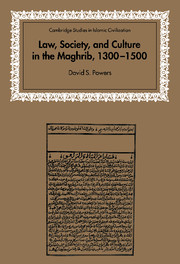Book contents
- Frontmatter
- Contents
- List of figures and tables
- Preface
- Introduction
- 1 Kadijustiz or Qāḍi-Justice? A Paternity Dispute from Fourteenth-Century Morocco
- 2 From Almohadism to Mālikism: The Case of al-Haskūrī, the Mocking Jurist, ca. 712-716/1312–1316
- 3 A Riparian Dispute in the Middle Atlas Mountains, ca. 683-824/1285–1421
- 4 Conflicting Conceptions of Property in Fez, 741–826/1340–1423
- 5 Preserving the Prophet's Honor: Sharīfism, Sufism, and Mālikism in Tlemcen, 843/1439
- 6 On Judicial Style: Two Fatwās on Tawlīj (ca. 880/1475)
- Conclusion: The Muftī
- Bibliography
- Index of Qur'ānic Verses
- Index of Prophetic Ḥadīth
- Index of Names
- Subject index
5 - Preserving the Prophet's Honor: Sharīfism, Sufism, and Mālikism in Tlemcen, 843/1439
Published online by Cambridge University Press: 05 July 2014
- Frontmatter
- Contents
- List of figures and tables
- Preface
- Introduction
- 1 Kadijustiz or Qāḍi-Justice? A Paternity Dispute from Fourteenth-Century Morocco
- 2 From Almohadism to Mālikism: The Case of al-Haskūrī, the Mocking Jurist, ca. 712-716/1312–1316
- 3 A Riparian Dispute in the Middle Atlas Mountains, ca. 683-824/1285–1421
- 4 Conflicting Conceptions of Property in Fez, 741–826/1340–1423
- 5 Preserving the Prophet's Honor: Sharīfism, Sufism, and Mālikism in Tlemcen, 843/1439
- 6 On Judicial Style: Two Fatwās on Tawlīj (ca. 880/1475)
- Conclusion: The Muftī
- Bibliography
- Index of Qur'ānic Verses
- Index of Prophetic Ḥadīth
- Index of Names
- Subject index
Summary
God loves not the public utterance of evil speech.
(Q. 4:148)Truly the noblest among you in God's eyes is he who is most Godfearing.
(Q. 49:13)O people, I have left among you that which, if you hold fast to it, you will not go astray: the Book of God and my descendants, the people of my house.
(prophetic ḥadīth)[be] securers of justice, witnesses for God, even though it be against yourselves or your parents and kinsmen”.
(Q. 4:134)Based upon his observations of the court of Sefrou in the 1960s and 1970s, Rosen has argued that the primary function of the qāḍī was to place litigants back in a position in which they could negotiate the terms of their relationship. Rosen's observation is an important one, albeit overstated. The interest of Muslim jurists in restoring social harmony cannot be viewed in isolation from their mandate to apply the law. The relationship between law and social harmony manifests itself dramatically in the case to be examined in the present chapter: a father and son living in Tlemcen in the middle of the ninth/fifteenth Century were accused of slandering several distinguished sharīfs and defaming the Prophet Muhammad. In his artful and carefully crafted opinion, the Jurist who was called upon to resolve the dispute defused a potentially explosive Situation by seeking a middle position between the “extremists of the hour.” Lacing his opinion with citations from the Qur'ān and ḥadīth that make repeated references to love, forgiveness, repentance, and humility, the muftī transformed a case that might easily have yielded the death penalty into a Statement about how sharīfs and non-sharīfs should relate to one another
- Type
- Chapter
- Information
- Law, Society and Culture in the Maghrib, 1300–1500 , pp. 167 - 205Publisher: Cambridge University PressPrint publication year: 2002



